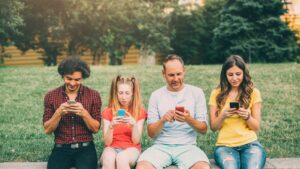Humans thrive by socializing with each other. Everyone requires companionship and connections to enjoy the beauty of life. The strength of your social relationships plays a vital role in your overall well-being. In fact, staying socially connected to others also helps with mental health issues like anxiety, stress, depression, and loneliness. Your friends and peers add joy to your life, boost self-worth, and provide you comfort. On the other hand, lacking social connections poses severe risks to your mental and emotional health.
The technological advancement in today’s world has made staying connected easier. Social media platforms like Facebook, Twitter, Snapchat, TikTok, and Instagram connect millions worldwide. One would think that socializing isn’t a problem anymore, but it’s essential to understand that social media isn’t a replacement for real-life social connections. In-person contact triggers the hormones that alleviate stress and make you happier. This process doesn’t occur virtually. Though social media has benefits, it is ironic that a technology designed to bring people closer often makes people feel isolated, depressed, and lonelier. The impact of social networking on mental health can be devastating as it results in worsening of pre-existing problems like anxiety and depression.

Is Social Media affecting your mental health?
Excessive social media use can create a vicious cycle. You start spending more and more time on social media whenever you feel anxious or lonely. It is like an addiction – you feel the fear of missing out (FOMO). These feelings negatively impact your mental health. Some of the signs that you’re addicted to social media, and it is harming your mind include the following:
- Spending all your time online than in the actual world with real people
- Comparing yourself to others on social media platforms
- You have low self-esteem, lack of confidence, or negative body image after looking at models and celebrities
- You keep checking social media platforms because you’re scared of what people post about you due to trauma from cyberbullying
- You’re distracted at school or work because you feel the urge to check your Facebook or Instagram
- You spend more time scrolling through social media than on self-reflection
- You engage in risky behavior or post embarrassing material to gain likes on social media
- Social media is always on your mind, before bed and first thing in the morning
- Worsening symptoms of pre-existing anxiety or depression
- You feel more depressed, anxious, or lonely after using social media
Reasons why excessive online social networking is harmful
While social media isn’t a replacement for face-to-face interactions, it can help stay connected, emotional support, and self-expression. The moderate use of social media can add positivity to your life and enhance wellbeing. Setting long-term consequences for such relatively new technology without enough research isn’t right – the relationship between mental health and social networking remains complex. However, excessive online networking on social platforms can harm your mental health. Here’s how social media plays with your mind and increases the risk of depression, anxiety, loneliness, and even self-harm:
It can promote envy and dissatisfaction
It’s common for people to feel envious or dissatisfied with their lifestyle or looks after watching celebrities and influencers on social media platforms. Even when you know that the images you’re viewing on social networking sites are unrealistic and sometimes manipulated, they still manage to make you feel insecure about your looks or what’s going on in your own life. It is essential to understand that people only share their success stories and highlights. Everyone has low points, but they hardly post them on social media.
Fear of missing out
Social media applications thrive on people’s fear of missing out or FOMO. While this fear has existed far longer than online social networking, social media still manages to make people believe that others enjoy and live better lives than them. The feeling of missing out on certain things triggers self-esteem and anxiety issues. FOMO can also lead to higher social media use – you feel the urge to pick your phone and scroll down the news feeds every few minutes. You’re always looking for updates or compulsively responding to every notification. This can be harmful, especially when you’re driving or missing out on your sleep. You start prioritizing social media over your safety and health.
Social media affects in-person relationships
Social media addiction is real. It affects many relationships because people tend to spend more time online than in reality with their loved ones. Though they are connected and added to friend lists, they hardly converse and only keep an eye on each other’s lives. Human beings require face-to-face contact to be mentally healthy. Nothing reduces everyday stress and lightens your mood more effectively than real-life contact with your loved ones. The more you prioritize online interaction over in-person relationships, the more you’re at risk for exacerbating mental health problems.
It makes people self-absorbed
Social media makes you self-absorbed. Displaying every moment of your life publically, sharing endless selfies, and your innermost thoughts can create unhealthy self-centeredness and turn real-life connections sour. It creates a sense of competition with others and others’ lives. You always want to dress a certain way, eat at a particular restaurant, or spend extravagantly, only to show off yourself on such platforms.
It can lead to social media addiction
After using social media, the dopamine levels rise in your brain. The brain identifies this activity as a rewarding one. However, these satisfying feelings experienced during the use of social media are only temporary. Your brain is tricked into positive reinforcement and leads to addiction. This pattern is also seen in other addictions.
Change your unhealthy social media routine
Here are some strategies for maintaining mental health in the online world:
- Reduce time online
- Quit using your phone before bed
- Use time-tracking apps to track the time you spend on social media. Then set an amount of time that’s healthy and doesn’t interfere with your daily routine
- Turn off your phone for sometime during the day when you’re busy
- Don’t take your phone to the bathroom
- Instead of killing time on social media, join groups spreading awareness regarding different social issues
- Use it as a learning platform. Follow news pages, subscribe to their online notifications so that you stay up to date regarding the happenings in the state
- Learn a new skill by watching DIY and creativity videos
- Connect with friends who are far away instead of just viewing their profiles
- Limit your checks
- Disable unimportant notifications
- Divert your focus. Try exercising or having a walk each
- Practice mindfulness
- Volunteer in social programs for real-life experiences

Get support from professionals
Are you, your family member, or a loved one suffering from social networking’s negative impact on mental health in Los Angeles, California, Corona, California, and Riverside, California? If so, you can get professional support from MindShift Psychological Services. The professionals at MindShift Psychological Services use in-depth therapy sessions like Individual Therapy and Group Therapy to help you manage your mental health concerns step by step and in a practical way. Begin your journey towards a healthier mind- Heal with MindShift Psychological Services.




